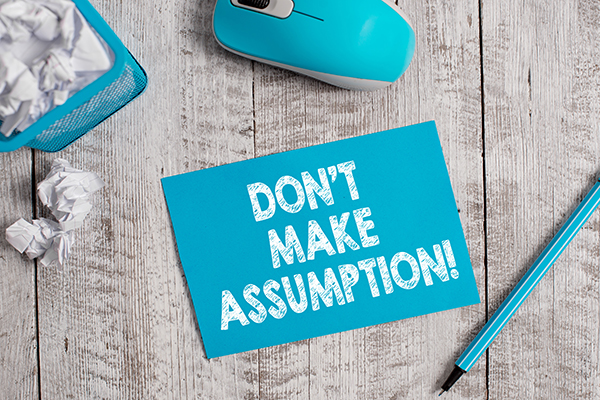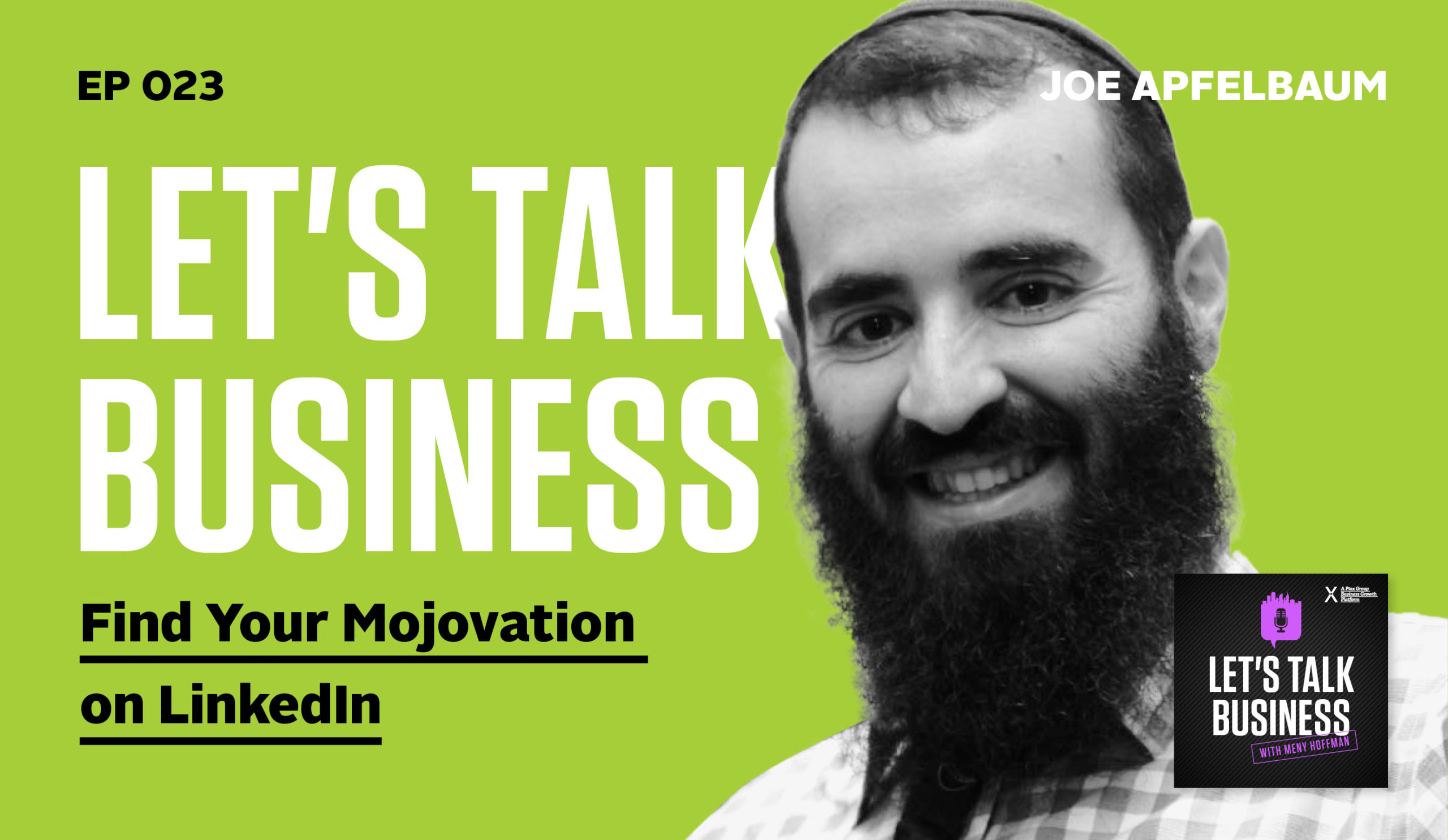Unlock the sales game with the number one authority in trust-based selling, Ari Galper, in this new marketing world where customer relationship matters most.
The sales game is no longer the same. The evolution of technology has changed that. With the economy that we live in, sales are no longer just about numbers; it’s about customer relations and trust-based selling. You need to build that trust with your customers if you really want that sale. Learn how to do that today with your host, Meny Hoffman, and his guest, Ari Galper, the CEO and Chairman of Unlock The Game. Ari is the number one authority in trust-based selling, and he’s here to help you take your sales game to the next level.
Listen to the podcast here:
Download the audio file here.
Close More Deals Through Trust-Based Selling—with Ari Galper
Ari, thank you for joining me on the show.
Thank you for having. I appreciate it, Meny.
When I speak to people who have something like the number one authority on trust-based selling, I’ll need an explanation. Not only an explanation of how you got there but also why about sales. Sales is brutal because you have now all the salespeople asking you for questions and there are salespeople who are trying to get as much information out of you, which I’ll try in this episode. I know that we have a huge following, people that are in sales or every business owner in sales, one way or the other. Give us a backstory, a little bit about your story on how you got to what you’re doing to lay some groundwork for our audience.
I live in Sydney, Australia, but I’m from California, originally. I met my wife on a dating site years ago pre-swiping. She was working in Los Angeles, so we met there and we dated. We came to Sydney and got married. We’ve been here for more than twenty years. I’ve got three kids, so we’re based out here. Prior to coming out here, I was a sales manager at a software company and we launched the first online website tracking data tools for website behavior. It’s now called Google Analytics. I’m sure you probably have heard of that.
We were the first ones to launch one of those tools. We got bought out over time but back then, it was the newest thing to be able to collect website data in real-time. My job was to bring the large accounts in. I had only eighteen salespeople with me and the big opportunities came across my desk. This one lead came across my desk and I called the contact back. It was a big company. I recognized them and there are lots of websites. He’s a nice guy and he agrees to a conference call and a demo of our product so we can show them what we do. If I close this one sale, it would double the revenue of the company in one go. That’s how big it was. It was a big opportunity.
They finally came at 4:00 on a Friday afternoon. I’ll never forget it. I was in the conference room with my CEO. I closed the door behind me. In the room, there was a big long conference table. In the middle of the table was a speakerphone, the corporate ones with the three legs on it. That black spaceship-looking phone. I dialed the number to call him for the conference call and he picked it up on his line. He says, “Hello.” I said, “Hello, John.” He says to me, “Ari, let us tell you who’s with us in the room today.” The next thing I know, I didn’t know any of us would be there. The next thing I hear is, “My name is Mike. I’m the CEO.” I’m like, “This is a good person to have in the room.” “My name is John. I’m the head of marketing.” This is great. “My name is Julian. I’m the head of global IT.” Even better.
Everybody on this phone call was basically a decision-maker. This is a call we hope to get as often as possible because they’re all in one place. I’ve introduced myself and begun to describe what we do. I gave a live demo over the web to show them what it looks like to collect information on a website we collected ahead of time. I showed them their stats. As I’m showing this information to them and describing what we do, I hear the noise on the phone call, “This is great. This is amazing. We love it.” They started asking me all kinds of questions. “How did it work? How do we install it?” I had all the answers. I was technically competent. I answered all the questions. There was so much chemistry on this phone call. It was like a love fest on the phone.
The perfect match made in heaven.
There’s no resistance. I’m saying to myself, “Yes.” I get the high five back here from my boss and give me a thumbs up in the corner of the room. They’re asking me all kinds of questions. I was new to sales. I had books at home. I went to seminars. I had CDs in my car back then. I was studying how to build rapport and answer objections. It was a fantastic call. The call comes to a close an hour later, my contact was like, “Ari, we loved it. This is great. Give us a call a couple of weeks, follow-up with us, and we’ll move this thing forward.” I said to myself, “Thank you, God. What a wonderful ending.” I said my goodbyes. I took my arm and I reached for the phone in the middle of the table to hit the off button on the speakerphone.
[bctt tweet=”Somewhere along the way, it has become socially acceptable not to tell the truth to salespeople.” username=””]
For some reason, the speakerphone by complete accident, now it’s divine intervention, my thumb hit the mute button instead of the off button. By complete accident, they were next to each other. I hit the wrong button, a small click happened and they thought I hung up the phone. In that split second, a voice said to me, “Ari, go to the dark side. Be a fly on the wall. Listen in. You have nothing to lose.” I pulled my thumb back for a couple of seconds. They started talking amongst themselves, thinking I left the call. What might you imagine would have said on that call? Not a trick question. What would you imagine and expect to hear after calling that they would say amongst themselves?
I was hoping they would say, “Let’s schedule an internal meeting to finalize the decision.”
That’s exactly what you expect after a call like that but let me share with you what they said verbatim word for word and it’s why we’re here. What they said was, “We’re not going to go with him. Keep using him for more information and make sure we shop someplace else cheaper.” Knife in heart and twist. I was in a state of shock. I finally snapped out of it and hit the off button. I looked at the wall and said to myself, “What did I do wrong? I was competent. I was professional. I wasn’t pushy. I answered their questions. I solved their problem.”
I had an epiphany. I realized to myself, somewhere along the way, it has become socially acceptable not to tell the truth to people who sell. It’s okay to say things like, “Sounds good. Send me information.” “We’re definitely interested.” “No, send me a proposal,” without having any intention of buying at all. I asked myself, “Why were they afraid to tell me the truth?” I realized that moment that there is an invisible river of pressure that flows underneath the sales process on every call you have with someone.
If you don’t consciously become aware of it and take the pressure out of the process, you’ll always have to fight this battle with someone chasing them and always be in this dysfunctional relationship where you never get to the truth. That became a whole revolution called trust-based selling, which I mentioned years ago, with a whole new mindset shift where your goal no longer is a focus on the sale anymore. Your goal is to build enough trust with someone to build this what I call a bubble of vulnerability, so they feel comfortable opening up to you and telling you the truth so you know where you stand. You don’t chase ghosts anymore and to humanize yourself having to pursue people who would never call you back. That became my whole unlock the game sales philosophy system over the last couple of years.
This is an amazing story and if we would end the episode here, there are many lessons to be learned from that story. You always say the challenge, or the problem is part of the solution. You cannot come up with a solution if you don’t figure out the problem. For salespeople, so many times they’re in the dark, they don’t know is it a product? Is it me? Is it my skills? Is it who I am? Is it the lead or whatever? They keep on jumping from one part to the other and never fixing the problem because they never identified a problem? Let’s go there because this topic of trust-based selling is such an important part. I did my own research. I’ve been following sales and my whole life as well. Let’s go there. How would you explain sales or training in sales versus trust-based selling?
The first thing we have to do to help people understand this concept is to do what I call to reboot the mental hard drive. What I mean by that is to clean out the old myths in the back of our mind that we believe selling is to clear that out to enter new ideas. I’ll cover a couple of classic sales myths and most of your readers still have embedded deep down inside the back of their subconscious. One is the idea that sales is a numbers game. That’s myth number one. I’m sure you’ve heard that before in your businesses.
The more contacts you make, the more sales, demos, meetings, or calls you have should equate into more sales, logically. We discovered in this economy now, it’s not about how many contacts you make anymore. It’s about how deep you go on each conversation. How good you are trust-building, not how good you are, how many contacts you make. The other myth is the idea the sale is lost at the end of the process. I’m sure you’ve been there before.

You had a deal pending that looked good and you’re waiting for the contract to come in and it disappears on you. What we discovered in this day and age with all that’s happening in the world, the sales not lost anymore at the end of the process. The sales are lost at the beginning of the process. I’ll prove it to you now in a fun way. If someone calls your office tomorrow morning, and you pick up the phone and you hear, “Hi. My name is… I’m with… We are a…” What goes through your mind in about three seconds?
“Let me hear more.”
You’re unusual. Most people usually shut down the back of their minds because they know it’s a salesperson when they hear the typical intro of, “Hi. My name is. I’m with. We are. We do.” We immediately and psychologically go, “I know what that is. That’s a sales call.” I’m not suggesting your readers are making outbound calls, maybe they are but what I will make a case for in our show is many of your readers are losing their opportunities, not at the end of the process, they’re losing at the beginning because they did not build trust with someone from, “Hello.”
Let’s stay there. How much of that is in control? Are you suggesting it’s a script being used? Are you suggesting that part or it’s even the wrong person being called in the first place?
I assume that’s something that’s a marketing issue, the quality of who your call but the core of this is that we’ve been programmed and we’ve been conditioned to use behaviors and languaging that is pattern-based used in the 1980s. The minute you start with a typical model of languaging and where people are used to, they associate you within a second with the negative salesperson stereotype. Old scripting and all that pattern recognition, that’s all got to go because we’ve developed our own, which we call trust-based languaging, which I’ll share with you. It replaces all those robotic scripts that basically don’t allow you to be authentic anymore and force you to a robotic mode, as I call it.
What was the third myth?
The third myth is the idea that rejection is part of the sales game. You’ve probably heard that before. Your old sales manager said to you, “You can’t get out there and take a no. If you don’t have thick skin, if you can’t get out there and push those numbers, you’re not made for success.” It’s old. Sale is crusty.
The sale starts as soon as you hit those.
What we discovered, believe it or not, in our research, is that rejection is triggered by certain things that we say and do unconsciously that cause the other person to put their guard up and shut us down. It doesn’t exist by itself. We created and I’ll walk you through it during the principal what those examples are with some real and live scenarios.
[bctt tweet=”To clear the mind is to reboot the mental hard drive.” username=””]
You’re seeing those three myths are not working because that’s old school and it never worked? It was a myth.
No. That stuff definitely worked pre-internet and pre-commoditization and what’s happening is most people in sales now are still using their old programming, conditioning, and languaging, which does not match with how the world has changed and people know those patterns. If you’re still doing the typical sales process that you’ve always done playing the numbers game and chasing ghosts, you are the problem, not your product or solution.
I am already hearing the voices of hundreds of salespeople saying, “Should I close shop? What am I doing?” What is the alternative? I hope you have some solutions as well.
First of all, you’ve got to be open-minded to letting go of all the old conditioning and programming brainwashing you’ve been through over the years to realize it’s time to upgrade your entire way of thinking and your approach to match to a level of trust. I tell people to stop selling. Instead, build trust with people, consciously. If you do that, the sales will roll in your direction. I’m happy to walk you through some examples now and some core principles behind them to show people how they do this in real-time. Give us real tactical examples they can use to experience this live after they know this.
We pride ourselves on that. In this show, we call it no-nonsense advice. The reason is we want to give people practical advice, so salespeople out there reading this, it’s not about throwing away the old and here’s with the new. Let’s get into some of the principles.
Our core principle number one is the idea of always diffusing pressure. Always be consciously thinking about how to take the pressure out of the sales process. We invented our own body of work around trust-based languaging and our own phrases that we use. There are play sales scripts that activate trust to get to the truth. Let me give an example of a real scenario. Let’s say you’re on phone with somebody, a first contact, the first opportunity of the company, maybe you’re selling business services or whatever. It’s the first conversation. It’s good chemistry, it looks like a good fit, and they are qualified. The call comes to an end at the end of your first call. What are we trained typically to do at the end of a call like that when we have somebody on the hook that we think could be a good buyer? What do we normally say to somebody? It’s not a trick question. What would you imagine most people would say?
“When should I follow up with you?”
“How about we move forward?” “How about we move to the next step?” “How about we move towards the sale.” We’re conditioned, we have a hot fish on our hook, our instinct is to move things towards the sale. What happens if you attempt to move somebody forward right there and they aren’t ready yet? What do you break with them at the beginning of your process?

Trust.
You break trust right there at the moment without even realizing it. It’s the same scenario, our approach, our mindset, and our languaging. The call is going well, it’s a good opportunity, they’re qualified, the call comes to the end of the call. Rather than saying, “How about we go to the next step?” Your readers might write this one down. What we say is, “Where do you think we should go from here?” How does that change the dynamic of the moment?
You’re throwing the ball in their court to decide what the next step is in order to make sure that they suggest what the next step should be XYZ.
The power is now shifted. When you said it to somebody, “Where do you think we should go from here?” Usually, they’re in a state of shock. They can’t believe that somebody would ask them what they want to do because they’re so used to being pulled down as a linear process as they know a mile away, and they know they hate it and they put their guard up. When you say to somebody, “Where do you think we should go from here?” Usually, they say things like, “I’ve got one more question. What about this. How about we move things forward?” What happens is the truth comes out.
The truth is your goal, not the sale. You want to know where they stand in its entirety because what happens is, if you don’t do that, they’ll seduce you by giving you bits of information that you think they’re going to buy something. You get excited, you start rolling down the trail, and you end up going, “How’d I get here? They’re calling me back?” You’re chasing a ghost. We have figured out that your goal is to completely disrupt the process not move them forward and instead get to the truth. The first trigger of rejection is languaging, the words that you use, that’s one example. What did you notice when I said, “Where do you think we should go from here?”
The lack of aggressiveness.
I’m slowing things down. I’m not creating momentum. I’m not passionate. I’m doing the opposite of how we’ve been trained, which is to move quickly, be passionate, be excited. That’s the exact thing that people hate because they can sense that you’re all about you and not about them. This is about deep trust-building. Trust is created when the other person feels that you are in their world.
Let me play devil’s advocate for a moment on this, which is, salespeople will say, and I do sales as well, if you throw the ball in their court, they might say, “Let me take a few weeks and follow-up with me,” or something along those lines. Within those next few weeks, they’ll make more research and find another agency or they’ll decide they don’t want the service, they don’t need the service and I want to work with them.
You don’t leave them hanging to let them go in their direction. What you do is you bring out the truth of whether they’re a fit with you or not. If they’re not a fit, you disengage. If they are a fit, and you can elegantly schedule a nice conversation without them feeling you are trying to pull them down your process. The way you do that is you do this, you say, “Would you be open to the possibility of scheduling a second conversation to see if I can help you along this process and take care of what you might be looking for? Would you be open to that?”
[bctt tweet=”Stop selling. Instead, build trust with people consciously. If you do that, the sales will roll in your direction.” username=””]
You’re asking the person to respond, “Yes.” It’s basically getting their permission for the next step.
You’re always asking permission. You’re never making assumptions. You’re never prematurely jumping in offering solutions. You’re not hungry to close that sale with a customer who can sense that you’re about to grab whatever you can and jump forward. That’s the worst thing you could ever do.
What would be another principle where something that trust-based selling would replace old-school selling?
The other core principle is the idea of what I call getting to the truth with people. What does that mean? What that means having your potential prospects feel comfortable telling you upfront completely where they stand. Everything, without anything left over for you to guess and chase at the end figured out they weren’t a fit. Let me give an example. Someone called my office, they got through my team and they got to me. The phone rang on a schedule, I pick it up and I hear, “Mr. Galper?” I said, “Yes.” He says, “My name is John Johnson. I’m with XYZ company.” I changed the name. He’s with a big company that you would recognize the name. They’re a global business. He’s like, “We’re looking to bring some change in our sales culture, upgrade our skillset in the new economy and we’re looking at you and two other people. We’d like to know first of all, why should we go with you? Why you’re the best and give me your best sales pitch.”
He says to me, on an inbound call. I took a deep breath. I’m a human being, too, and they’re a big company. I relaxed. I stayed calm. I went back to my philosophy and got centered. I lowered my voice and I said this to him, “Isn’t that interesting?” I paused and said to him, “Over here in our company, we have a similar process to you where we ask them questions, gather information to see if we’re a good fit. If we’re a good fit, we decide where to go from there. Would you be open to that?”
That’s all I said to him. The next thing I found was I heard nothing. Is he still there? He breathes and you could feel like this whole weight came off his shoulder. He breathes across the phone, lowers his voice, and says to me, “What questions do you have for me?” The next thing I know, we’re having a normal conversation. Within five minutes, I discovered one, he’s not a decision-maker. Two, he has no budget, and three, he’s curious as to what I do. Off he went to YouTube or wherever he gets to my videos. We have hung up the phone. In that process that I did with him, what did I save myself from?
You would go back and forth with this person giving them proposals and plans of action, whatever it is, and ultimately, he’s not a decision-maker. He doesn’t have the budget.
It saved me from heartache, chasing, pursuing, wasted time. There’s a drug in our bodies that’s active with inbound calls like that. Do you know what the drug is called? It’s called hopium. The hopium drug is when you get the inbound call and they want to buy. You’re so excited you tell your team on the board, “I got the call.” You tell your husband and wife. You get the hopium and you’re so excited all month long. You call them back and you get their voicemail. He’s not there. What do you do next? You go to the computer and you’re like, “I’m writing you to follow up on our conversation,” and there’s no response. You’re like, “This is horrible,” and you crash from the hopium drug.
I’m going to ask your readers to take a verbal oath with me, not legal but a verbal one, to never again, after this episode, use this phrase I’m about to give you ever again in the world of selling and business ever again. For those of you who are reading who’s been in sales for a long time, this might hurt a bit. Hopefully, it’s okay. I’m going to ask all your readers to never again after knowing this to ever again use the phrase, follow-up ever again in their sales life.

Delete.
What’s the only industry in the world that uses word follow-up? Sales. There are a few more classic ones, too. You probably know from the old days. Do you remember those? They’re like, “I’m giving you a call to follow-up.” There are a few more besides follow-up, “I’m giving you a call to check-in.” Do you remember that one? How about this one, “I’m giving you a call to touch base.” Do you remember that one? These are all sales languaging terms that associate you with a negative salesperson stereotype that everybody hates.
How do we do this? Here we have a lead. It was a great conversation, your middle of building trust because he started off at permission-based selling and somehow, they’re busy. They’re running thousands of different projects and I need to follow up. What do you do?
You don’t follow up, that’s for sure, ever again. Instead, what you say is this, “I’m giving you a call to see if you have any feedback on our previous conversation, on our last meeting, or our proposal?” Feedback is going away from the sale. It’s going backward. Follow-ups are going forwards. Your job is not to create forward momentum at all. Momentum puts pressure on people. People shut down. When you say to somebody, “I’m giving you a call to see if there’s any feedback,” watch what happens. They start talking and talking and you’re like, “I can’t believe that’s what they told me.”
Let me ask you a question and this is something that has been on my mind as I was preparing for this episode, although we could stick to those principles forever. I know that there are introverts and extroverts. There are all these conversations about who is better at selling but now you’re moving the conversation to trust-based selling, which is a totally different dynamic. Have you seen introverts or extroverts one better than the other when it comes to trust-based selling?
I find that extroverts that are overly trained to be excited and enthusiastic are the ones who have to be aware of how they’re being perceived. If you meet somebody for the first time in the opportunity, and you’re over-enthusiastic, or you’re prematurely offering your solution before you get to the problem, you’ve lost them at hello. The introverts are the ones that do the best the fastest because they’re the ones who don’t put their personality in the way of trust-building. We’ve been conditioned to believe that our job is to build a relationship with someone pre-sale. I’m about to tell you something now that might shock a lot of your readers. We believe your job is to not build relationships anymore pre-sale.
Your job is to build a relationship post-sale, not pre-sale. Pre-sale, your job is only to build trust, not relationships. They are mutually exclusive. We are taught from the old gurus, “How’s it going? It’s nice to meet you,” and become their friend, getting to like us more and build rapport. That’s all fake and they know it. It’s a game. They don’t want to become your friend. They want you to solve their problem. I’m dropping a bomb here in saying if you are trained to believe your job is to get to know people and have them like you first before we make the sale, you make a huge mistake because trust-building is separate from relationship building.
Based on what you’re sharing, I want to get your opinion, there is this notion out there when somebody says, “I tried to do sales, but sales is not for me.” If it’s trust-based selling, nobody is exempted from building trust with people around them. Is that the case or there’s still something about being a salesperson?
When people say, “Sales doesn’t work for me. I hate selling,” what they’re talking about is that negative old-school impression of what selling is. When you’re learning trust-building and trust-based selling, you are your authentic self and all you want to do is help them solve their problem. It’s like a doctor-patient relationship. The patient comes to you and says, “My shoulder hurts,” and you say, “Let me take a look. Is it right here? Let me take a look. We need a little diagnostic. An X-ray and an MRI.” That’s what trust is about. It’s about you being the doctor.
[bctt tweet=”The only industry in the world that uses the word “follow-up” is sales.” username=””]
Doctors aren’t ethically allowed to provide their solution, medicine, or prescription until they’ve done a thorough diagnostic of the problem. This is a new sticker I’m working on for your back of your car, “Doctors don’t do coffee. Doctors don’t do LinkedIn. Doctors don’t want to become your friend,” because they understand that their goal is for you to trust them to solve your problem. You extract all that sales stuff you’ve been carrying all these years. It’s what I call sales armor. When you go to work and you get all ready for the battle, the bullets, the chasing, and all that, you will lose yourself and your authenticity. In this day and age after COVID, everyone knows when you’re playing the game.
This is gold, every single piece of what we share. I want to get a couple of questions in. Time is flying by. I know that you’re working on a book called The One Call Sale. I want you to explain what the book is all about and how it connects to the core of what we discussed, which is trust-based selling.
I’m working on a book called The One Call Sale and a TV show coming out on the internet. The whole idea and I figured this out for a few years with my private client work is how to compress the sale cycle for multiple steps to one conversation. I don’t mean cold calling. If you have a scheduled call with somebody, a pre-scheduled call, and they are qualified, as far as I’m concerned. You should have a 100% conversion rate on that one call either to a yes or no without follow-ups or chasing the proposal, unless it’s a huge company that has multiple decision-makers. Yes, there will be multiple calls. If they’re the one decision-maker and you can’t onboard them on one call, that means your process is broken.
Let me give you an example. I have a new private client of mine, a financial advisor and I was talking to him and I said, “How is it going?” He goes, “Not good.” I go, “What do you mean?” He’s like, “We lost three opportunities this week.” I go, “What do you mean? What happened? What’s your process?” He’s like, “We have a three-step process. Step one is we get to know them first. Step two, we use a discovery call and step three is we diagnose the issues and we match them to the solution. The whole industry does that.”
I asked, “Where are you losing them?” He says, “In between each of the steps and afterward.” I said, “Why are you doing three steps? That makes no sense to me. Put the whole thing into one step.” He goes, “That’s what the industry is doing.” I said, “How’s that working for you?” That’s the dumbest thing in the world. Having multiple steps tells me you did not build enough trust with them on that first conversation. That’s why we’re being stretched out down lots of processes to chase people because we have never been trained to build trust with somebody on one first call consciously.
Think about it. They’ve got a problem and you’ve got the solution. They don’t want to go through hoops to get the answers. They don’t want multiple phone calls and autoresponder series, downloads, and emails. They want their problems solved. What do we do? We messed the whole thing up. All they want is someone they can trust. They don’t even care about your solution. We think they care about our solution and we want to tell them how it works and here’s how we operate. All they ask themselves the entire time in the back of their minds is, “Do I trust them?” When you start talking about your solution and your services, do they care? They’re not qualified to discern if your solution is right for them. They’re not the experts. You are. For you to talk about your solution is irrelevant.
Within that book, you’re going to go through the different pieces of that phone call.
I’m going to go through the milestones. I’ve got some information on that now on my website, but I’m going to go through that whole system and it will be a revolutionary change in the entire sales industry where that comes out.

I want to ask you one more final question on this topic because you started off with that and I wrote it down. I wanted to get back on this. You mentioned that it’s all a numbers game and industry knows, the more people you call the more it’s a numbers game. I know that I speak to salespeople sometimes. You said it’s not a numbers game. The industry says it’s a numbers game. When I speak to salespeople a lot and I always say you don’t control the outcome but you could control the input, which is the more you input, the outcome will show for it. How could you marry those two statements or you don’t?
It’s not about input. It’s about how good you are in trust-building. You could have ten calls a day with people if they’re qualified. Each of those people should become clients, not 100 calls a day.
You’re saying that either meaning the 100% conversions either it’s yes or no. There’s not a large huge pipeline and every person on a different stage. That’s something that our readers should take out of it. It’s not about qualifying and converting every client for the first call. At least knowing if it’s a yes or no.
No more chasing ever again. If you’re chasing somebody in your pipeline right now, you’ve done something wrong.
Ari, how could people find out more about you, what you’re sharing, and the resources that are available?
The best place to go is www.UnlockTheGame.com and there’s an overview course there. You can have a one-on-one chat with us about your situation. Bring us your toughest sales challenge and see if we can solve it for you. We call it Stump the Guru, so we have an opportunity for that as well. Reach out to us and watch how we work with you and get a sense of what we do. Read this a couple of times and try what I gave you. Test those languaging. Watch me go from here. Rather than saying, “Would you be interested,” say, “Would you be open?” Try this and watch what happens. Use the word feedback and not follow-up. Try a few things on the phone with somebody. Watch what happens. If it works for you, then you know you finally found your home.
Let’s close with the four rapid-fire questions. Number one, a book that changed your life.
I would say probably Relentless.
[bctt tweet=”Your job post-sale is to build a relationship. Your job pre-sale is to build trust.” username=””]
Number two, a piece of advice you got though you never forget.
My dad used to always tell me, “If the crowds go in this direction, you go the opposite direction.”
Number three, is there anything you wish you could go back and do differently?
Do you remember that conference call I told you about at the beginning of the story where I got lied to? People always say to me, “Ari, what would you do if you knew what you did now and went back?” The answer would be I never would have had the call because on that first call would have figured out where I fit or not.
Last and final question. What’s still on your bucket list to achieve?
Probably to impact millions of people, their whole industry and change the economies around the world by realizing all the losses that are being created by people who are selling incorrectly.
This was great. Ari, thank you for joining us. I know your time is valuable. That is why in the name of our readers, I will forever be grateful for sharing some of your time with us.
Thank you.
It was my pleasure.
Important Links:
- https://www.LinkedIn.com/in/arigalper/
- Ari Galper
- YouTube – Unlock the Game
- Relentless
About Ari Galper
 His new book “Unlock The Sales Game” has become an instant best-seller among business owners and entrepreneurs across the globe.
His new book “Unlock The Sales Game” has become an instant best-seller among business owners and entrepreneurs across the globe.
Ari Galper is the world’s number one authority on trust-based selling and has been featured in CEO Magazine, Forbes, INC Magazine, SkyNews and the Australian Financial Review.
As trust becomes the most important currency in the new economy, the act of selling as a de-humanizing process with endless “chasing”, has been completely re-invented and anchored in the timeless values of integrity and trust – through Trust-Based Selling.
In his best-selling book, “Unlock The Sales Game”, Ari describes his revolutionary sales approach based on getting to the truth and why having a mindset of focusing on deep trust, instead of “the sale” – is ironically, 10 times more profitable.
Ari Galper has been on a mission for the last decade to change the world through trust, starting with the sales and business world.








